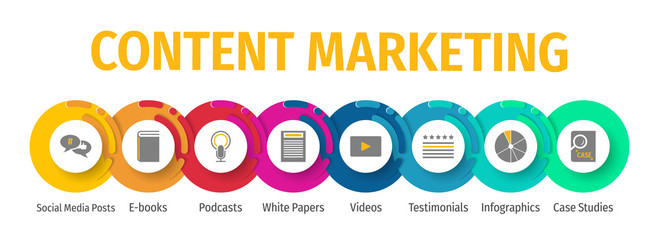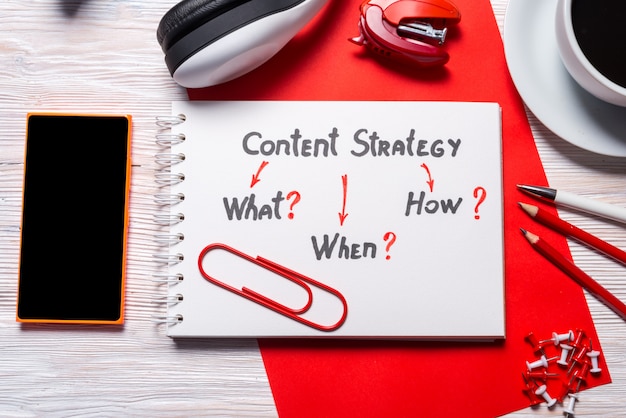A Comprehensive Guide To Content Marketing
Get ahead of the competition with our comprehensive guide to content marketing. Learn how to create engaging content, increase traffic, & drive sales.

Content Marketing: A Definitive Strategy for Business Success
Content marketing has witnessed a surge in popularity over recent years and for good reason. Its effectiveness in boosting brand awareness, generating leads, and driving sales cannot be underestimated.
In this comprehensive guide, we will delve into the essence of content marketing, explore the creation of high-quality content, and uncover the diverse types of content available.
What is Content Marketing?
Content marketing entails the creation and dissemination of valuable, relevant, and consistent content, aiming to attract and engage a clearly defined audience and, ultimately, drive profitable customer actions.
While the ultimate goal remains consistent, the specific objectives of content marketing initiatives can vary widely depending on the company, its products or services, and the target audience.
This continuous process demands meticulous planning, creation, distribution, measurement, and optimization to yield successful results.
However, the investment in a solid content marketing strategy can make a remarkable difference in the growth of your business.
The Power of Content Marketing
Content marketing stands tall as one of the most potent digital marketing strategies available to businesses today.
By crafting and disseminating valuable, relevant, and engaging content, companies can effectively attract and retain customers, ultimately leading to increased sales and brand value.
To achieve the full potential of content marketing, it must be integrated into a holistic marketing approach. When harnessed correctly, content marketing can enable businesses of all sizes to thrive in today's competitive marketplace.
Maximize Your Online Presence with Our Digital Marketing Agency
-
SEO: Unlock more SEO traffic and see real results with our expert optimization services.
-
Content marketing: Attract and retain customers with high-quality, engaging content that drives traffic and generates leads.
-
Social media marketing: Our team creates epic content that will get shared, get links, and attract traffic on social media platforms.
-
Google Ads: Effective paid strategies with clear ROI. Let our team help you get the most out of your ad spend.
-
Email marketing: Connect with your audience and drive conversions with targeted email campaigns.
-
Web design and development: A visually appealing and user-friendly website is key to attracting and retaining visitors. Our team can help you create a website that converts.
Exploring the Different Types of Content
Content can be broadly categorized into two types: informational content and transactional content. Informational content aims to educate, entertain, or inform the reader, while transactional content focuses on promoting a product or service.
Both types of content hold significance and the choice between them relies on the goals set for the content.
-
Informative Content: This type of content is intended to educate, entertain, or inform the reader. It aims to provide valuable insights and knowledge on specific topics, ultimately positioning the brand as a thought leader and increasing brand awareness.
-
Transactional Content: On the other hand, transactional content is created with the primary goal of promoting a product or service. It is often used to generate leads or drive direct sales.
Additionally, these types of content can be further classified based on their specific functions and objectives:
-
SEO Content: This type of content is strategically crafted to improve the search engine ranking of a website. It typically includes articles, blog posts, and web pages that incorporate relevant keywords to enhance visibility in search engine results.
-
Branded Content: Branded content is aimed at building the brand's identity and reputation. It may include a variety of content formats, such as company blog posts, customer testimonials, and brand storytelling.
-
Engagement Content: Engagement content is designed to initiate interactions and conversations with the audience. It can take various forms, such as surveys, quizzes, contests, and photo galleries, encouraging active participation.
-
Lead Generation Content: Lead generation content aims to attract potential customers and generate leads for the business. It often includes downloadable resources like PDFs, eBooks, and whitepapers, which users can access after providing their contact information.
It is essential to experiment with various content types to discover the most effective approach for your business and target audience.
Developing an Effective Content Marketing Strategy

In the digital era, content reigns supreme. Crafting a well-rounded content marketing strategy can expand your reach, enhance brand awareness, and boost sales.
To embark on a successful content marketing journey, consider the following key steps:
-
Understand your audience. Clearly define your target audience and identify the type of content that will resonate with them.
-
Set clear goals. Establish concrete objectives for your content marketing efforts, aligning them with your overall business goals.
-
Create a content calendar and editorial plan. Organize and schedule your content marketing efforts to ensure consistency and relevance.
-
Promote your content. Utilize various channels, including paid advertising, social media, search engine optimization, and email marketing, to promote your content effectively.
-
Measure your results. Implement analytics to track the performance of your content marketing initiatives and make informed decisions for continuous improvement.
Moreover, remember that content should not solely focus on sales but should instead engage, inform, and entertain your audience.
Crafting High-Quality Content
Creating exceptional content is paramount to the success of your content marketing strategy, particularly if you aim to rank well in search engines. To generate high-quality content, follow these essential tips:
-
Conduct In-Depth Research: Thoroughly understand your chosen topic before commencing the writing process.
-
Know Your Audience's Needs: Identify your audience's needs, wants, and problems, tailoring your content to address them effectively.
-
Foster Engagement: Craft content that captivates and entices your readers, keeping them engaged from start to finish.
-
Ensure Originality: Deliver content that is well-written, informative, and unique to your brand, avoiding any plagiarism.
-
Enhance Visual Appeal: Utilize images, infographics, and other visual elements to make your content visually appealing and easy to digest.
-
Be Concise and Clear: Get straight to the point, avoiding unnecessary jargon or verbosity.
-
Deliver Value: Your content should provide valuable insights, information, or solutions to your readers.
-
Polish Your Writing: Proofread meticulously to eliminate grammar and spelling errors that could deter your audience.
Remember, the quality of your content will determine the success of your content marketing endeavors.
Promoting Your Content Effectively

There are numerous avenues to promote your content effectively, including paid advertising, social media, search engine optimization, and email marketing.
The most successful approach usually involves combining multiple methods to maximize exposure.
-
Paid Advertising: Investing in paid advertising can rapidly increase the visibility of your content to a broader audience.
-
Social Media: Utilize social media platforms to share your content with a wide audience without incurring additional costs.
-
Search Engine Optimization (SEO): Optimize your content to ensure it ranks well and is discoverable by individuals actively seeking relevant information.
-
Email Marketing: Implement email marketing campaigns to target specific audiences and deliver tailored content directly to their inboxes.
In all cases, the key to successful content promotion lies in creating compelling, valuable, and relevant content that resonates with your target audience.
Measuring Content Marketing Success

While the saying "content is king" holds, measuring content marketing success can be challenging. The assessment heavily depends on specific goals and objectives. Nonetheless, several commonly used metrics provide valuable insights into content marketing performance:
Engagement: Engagement is a crucial metric in content marketing as it measures the level of interaction and involvement of users with your content.
It provides insights into how well your content resonates with your audience and how effectively it captures their attention.
Some key aspects of engagement include:
-
Likes: Likes signify that users appreciate your content or find it interesting. It shows that they are acknowledging and endorsing your message.
-
Shares: When users share your content with their network, it indicates that they find it valuable enough to recommend to others. Shares can significantly expand your content's reach and visibility.
-
Comments: Comments reflect the level of user engagement and their willingness to participate in conversations sparked by your content. Valuable discussions in the comment section can further enhance the impact of your content.
-
Time Spent on the Page: The amount of time users spend on your content page is a strong indicator of how engaging and relevant the content is to them. The longer time spent indicates higher interest and engagement.
Reach: Reach measures the number of individuals who have been exposed to your content. It represents the potential size of your audience.
Key elements to consider when assessing reach are:
-
Organic Reach: This refers to the number of people who have encountered your content through unpaid means, such as shares, word-of-mouth, or direct searches.
-
Paid Reach: Paid reach involves the number of individuals who have been exposed to your content through paid advertising, sponsored posts, or promoted content.
Impressions: Impressions refer to the number of times your content has been displayed to users, regardless of whether they engaged with it or not.
This metric gives you an idea of how many times your content has been seen across various platforms. One user may account for multiple impressions if they come across your content several times.
Revenue: Revenue is a tangible and vital metric that directly ties content marketing efforts to the financial success of your business.
By measuring the revenue generated directly attributable to your content, you can assess the ROI (Return on Investment) of your content marketing campaigns.
Conversions/Leads: This metric measures the number of desired actions taken by users after engaging with your content.
Desired actions could include signing up for a newsletter, filling out a contact form, downloading a free resource, or making a purchase.
Monitoring conversions and leads help you gauge the effectiveness of your content in driving valuable actions from your audience.
Awareness/Brand Awareness: This metric evaluates the extent to which your content has increased awareness about your brand or business. It encompasses various aspects, such as:
-
Visitor Traffic: The number of visitors your website receives, indicating the interest generated by your content.
-
Page Views: The number of times your content pages are viewed, indicating user interest in specific topics.
-
Video Views: The number of times your video content is watched, reflecting the reach and engagement of your multimedia content.
-
Social Media Activity: Metrics like followers, shares, likes, and mentions on social media platforms reflect the level of brand exposure and engagement with your content.
Evaluating these metrics collectively enables you to gain a comprehensive understanding of the performance of your content marketing strategy.
By analyzing and optimizing based on these insights, you can continuously improve your content and achieve greater success in reaching and engaging your target audience.
In conclusion, content marketing serves as a powerful tool to reach and engage your target audience, leading to business growth.
Remember that the key to success lies in creating high-quality content that captivates and persuades your audience. Should you require assistance from a professional content marketing agency, do not hesitate to contact us.
We are Kenya's leading marketing agency in Kenya and content marketing experts, eager to help your business thrive.

Strategist Profile
Abala Tom
Digital systems strategist specializing in high-performance SEO, Google Ads, and conversion optimization. Mission: to replace marketing 'guesswork' with predictable revenue systems.